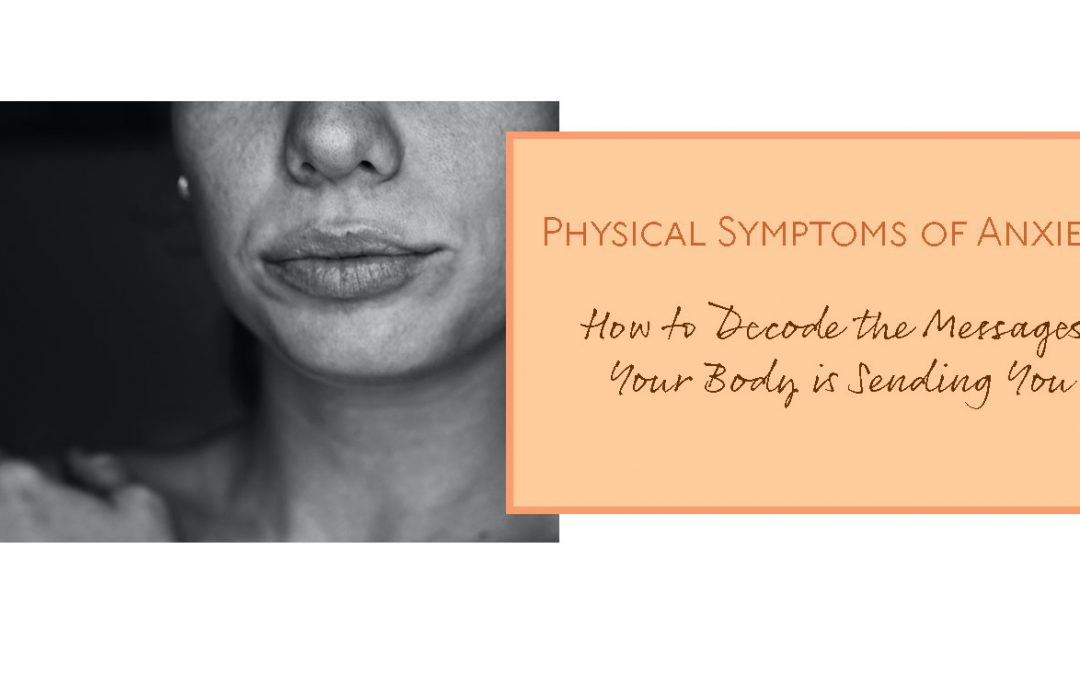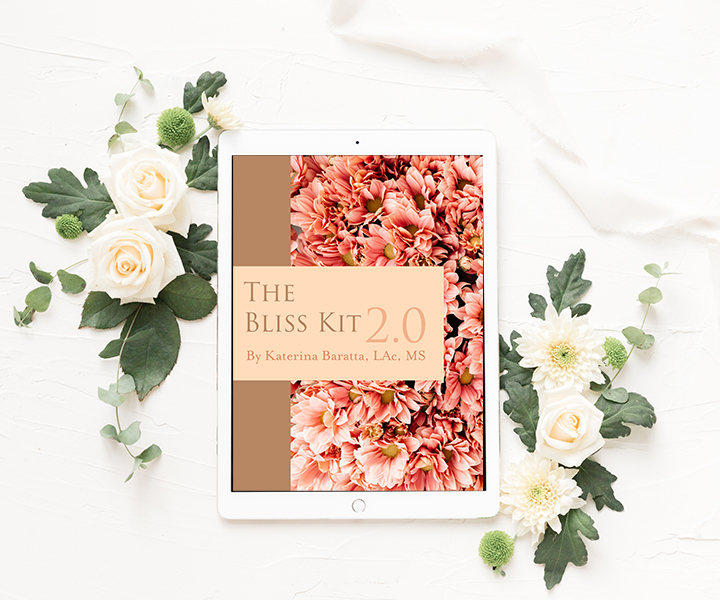Anxiety isn’t just in your head, there are also physical symptoms of anxiety, and they can point you in the direction you need to heal.
Do you get stomach aches? Headaches? Muscle tension? Foggy brain feeling and insomnia? Or maybe you’re totally exhausted?
Believe it or not, these are all common symptoms of anxiety.
Because anxiety isn’t just in your head.
It’s not just overthinking and neuroticism.
Anxiety can manifest as many different symptoms that are experienced in both the mind and body.
But while all of these symptoms are related to anxiety, they point to a deeper imbalance.
This is because symptoms are messages from your body.
Symptoms are the way your body communicates with you about what it needs.
And it’s your job to learn your body’s language so you know what to do to bring yourself back into balance and relieve both the mental and physical symptoms of anxiety.
Once you understand what your body is telling you, you can nip the imbalance in the bud before it spirals into something bigger.
But how are you supposed to learn your body’s language?
Luckily, traditions like Chinese medicine and Indian Ayurveda have taken some of the guesswork out of the equation.
These traditions have recognized the mind-body connection for thousands of years, and have passed down the wisdom of translating symptoms for generations, so you don’t have to figure it out all on your own.
Here’s what some of the most common physical symptoms of anxiety mean:
Stomach pain and digestive trouble.
According to Chinese medicine, digestion falls into the realm of the Earth organs.
And Earth is related not just to your ability to transport, transform, and absorb nutrients, but also to your sense of connection and stability in life.
So if you’re experiencing stomach pain, gas, bloating, irregular bowel movements, or other forms of digestive discomfort, there’s a good chance you’re also experiencing disconnection from your body, community, and nature.
There are lots of ways to remedy this.
To connect more with your body, practice yoga, qigong, or try eating one meal a day mindfully.
Connect with your community by writing a letter of appreciation to a friend, call your aunt up on the phone, or make it a point to ask the cashier at the grocery store about how they’re doing.
And to connect with nature, get outside!
Go for a walk in the woods, plant your bare feet on some soil, and if it’s too cold to take your shoes off, hug a tree for a full minute.
Little actions of connection add up to big results, and even though these may seem to be unrelated to digestion, you’ll be amazed at what an impact they have over time.
Fatigue, insomnia, foggy brain feeling, and difficulty focusing
From an Ayurvedic perspective, anxiety is a sign of imbalance in the Vata dosha, which is ruled by the Air element.
Air is light, moves a lot, and can unpredictable.
Too much Air in your system, and your mind rushes around 1000 MPH with nothing to hold on to, which leads to anxiety symptoms like insomnia, foggy brain feeling, and difficulty focusing.
And all of this movement is downright exhausting!
So it’s no wonder so many people with anxiety feel wired and tired.
To counterbalance all this Air, you need to introduce heavier, earthier elements into your life.
Meditation is an excellent, scientifically proven way to regulate your nervous system and calm anxiety. (1, 2, 3)
Having a regular routine so your circadian rhythm becomes more predictable can also be extremely helpful in grounding some of that erratic Air in your system. (4)
Try to wake up at the same time every day (yes, even on weekends!).
When you wake up at a consistent time, cortisol kicks in and helps you feel less groggy.
From there, set your bedtime at a consistent time, too.
The sleep scientist Matthew Walker recommends go to bed 8 1/2 hours before your alarm is set to go off. This gives your body enough time to settle in and fall asleep while still allowing for the full 8 hours of restorative rest you need to optimize your stress response. (5, 6)
Eating on a regular schedule is also a good idea.
For a few days, observe at what time you tend to get hungry.
Then decide on a regular schedule and stick to it as best you can.
You’ll be amazed!
After just a week or two of a regular sleep and eating schedule, your body is going to take over and you won’t even have to look at the clock anymore.
Plus, you’ll watch your anxiety levels plummet.
Muscle tension, TMJ, and headaches
Anxiety is a stress response, which means that when you’re experiencing symptoms of anxiety your sympathetic nervous system is running the show.
In order to come back down to center, you’ve got to turn down your sympathetic nervous system and activate your parasympathetic, rest-and-digest mode instead.
And this comes down to the vagus nerve.
According to polyvagal theory, the vagus nerve regulates which nervous system is active, sympathetic or parasympathetic. (7)
And what’s really interesting about the vagus nerve is that 80% of its fibers run from the body to the brain. (8)
So even though you might want to think your way out of anxiety, the best way to heal is actually through your body.
Simply put, to heal anxiety, you’ve got to move, and if you don’t move, you’re going to feel physical and emotional pain.
More and more studies are showing that exercise is just as important for mental health as it is for physical health, and regular exercise has a direct impact on anxiety levels. (9)
But getting your heart rate up isn’t the only way to heal anxiety through the body.
There is a saying in Chinese medicine: “Where there is pain, there is no flow. Where there is flow, there is no pain.”
And because Chinese medicine sees the mind and body as the same thing, this applies to emotional pain as well as physical.
You literally feel your emotions in your body, and emotions are meant to move.
The word emotion stems from Latin, “e” meaning “out”, and “motion” meaning “movement”.
So when you suppress emotions and your body’s expression of those emotions, they turn into physical pain and anxiety because there’s a lack of flow.
Again, this comes down to connection.
The more connected you are to your body, the less distracted you are by what’s going on in your head, and the easier it becomes to process stressful emotions out before they turn into anxiety.
Letting yourself feel your feelings and expressing them physically is really important.
But if you were raised in Western society, there’s a good chance you’ve been taught to spend more time in your head than your body, so learning to reconnect with your body can take some practice.
That’s ok.
Be gentle with yourself.
You’re strengthening those neural connections every time you set aside time to meditate, practice yoga, go for a mindful walk, and really tune into the sensations in your body.
The more you practice, the more you’ll learn to perceive.
And as you start to feel more, remember to let those feelings flow!
Feel the feeling, and ask yourself if any images, smells, textures, or other sensations come up when you feel it.
Then feel into it some more and see if it wants to move.
You may find that you start to cry, or your body starts to shake, or you want to moan, or shout, or even laugh.
Whatever it is, let it come up and express itself.
Because that’s how you release emotion, and it’s hands down the best way to heal the physical symptoms of anxiety, too.
References:
- https://pubmed.ncbi.nlm.nih.gov/31717682/
- https://pubmed.ncbi.nlm.nih.gov/26334339/
- https://pubmed.ncbi.nlm.nih.gov/30732832/
- https://pubmed.ncbi.nlm.nih.gov/26216591/
- https://www.ncbi.nlm.nih.gov/pmc/articles/PMC7045299/
- https://psychology.berkeley.edu/news/sleep-scientist-warns-against-walking-through-life-underslept-state
- https://www.ncbi.nlm.nih.gov/pmc/articles/PMC3108032/
- https://www.ncbi.nlm.nih.gov/pmc/articles/PMC4017164/
- https://pubmed.ncbi.nlm.nih.gov/28088704/





